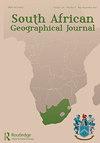从“希望的水文学”到“绝望的水文学”:对津巴布韦南部半干旱地区Mushandike小规模灌溉计划的女权主义回顾
IF 1.4
4区 社会学
Q3 GEOGRAPHY
引用次数: 1
摘要
一段时间以来,大型水坝建设对自然和社会环境的影响一直是全球发展讨论的焦点。关于大坝项目的文献主要集中在人类和野生动物从自然栖息地的迁移,以及大坝对城市和工业转型的贡献。关于在公共地区修建小型水坝和小规模灌溉工程的文献很少。本文考察了穆尚代克灌溉计划的现状,该计划旨在改变津巴布韦南部半干旱生态地区农村人民的生活。我们在女性主义理论框架的指导下,使用人种学的数据生成原则来获得女性农民的生活经验。Mushandike小规模灌溉计划多年来一直是女性农民的“希望水文”。然而,多种因素,包括自然因素和人为因素,正在把它变成“绝望的水文”。尽管农业仍然是从商业的角度来进行的,但低效的水和土地分配管理系统造成的水资源压力,与父权制的意识形态实践有关,已经将灌溉计划推向了一个艰难的轨道。这篇文章建议在灌溉计划的管理中进行范式转变,以确保重新采用最初的精神——灌溉农业等同于正式就业。本文章由计算机程序翻译,如有差异,请以英文原文为准。
From ‘hydrology of hope’ to ‘hydrology of despair’: a feminist review of Mushandike small-scale irrigation scheme in the semi-arid region of Southern Zimbabwe
ABSTRACT The physical and social environmental repercussions of large dam construction have pre-occupied development discourse for some time globally. Literature on dam projects focuses on the displacement of humans and wildlife from their natural habitats and the dam’s contribution to urban and industrial transformation. There is a dearth of literature on small dams and small-scale irrigation projects in communal areas. This article examines the status of Mushandike irrigation scheme, which was designed to transform the lives of rural people located in the semi-arid ecological region of southern Zimbabwe. We used ethnographic principles of data generation guided by a feminist theoretical framework to get to women farmers’ lived experiences. Mushandike small-scale irrigation scheme has been a ‘hydrology of hope’ for women farmers for many years. However, multifarious factors, both natural and human-induced, are turning it into a ‘hydrology of despair’. Although farming is still done from a business perspective, water stress due to an inefficient water and land allocation management system, linked to patriarchal ideological practices, has driven the irrigation scheme onto a difficult trajectory. The article recommends a paradigm shift in the irrigation scheme’s management to ensure that the original ethos – that irrigation farming is equivalent to formal employment – is re-adopted.
求助全文
通过发布文献求助,成功后即可免费获取论文全文。
去求助
来源期刊

South African Geographical Journal
GEOGRAPHY-
CiteScore
3.40
自引率
7.10%
发文量
25
期刊介绍:
The South African Geographical Journal was founded in 1917 and is the flagship journal of the Society of South African Geographers. The journal aims at using southern Africa as a region from, and through, which to communicate geographic knowledge and to engage with issues and themes relevant to the discipline. The journal is a forum for papers of a high academic quality and welcomes papers dealing with philosophical and methodological issues and topics of an international scope that are significant for the region and the African continent, including: Climate change Environmental studies Development Governance and policy Physical and urban Geography Human Geography Sustainability Tourism GIS and remote sensing
 求助内容:
求助内容: 应助结果提醒方式:
应助结果提醒方式:


